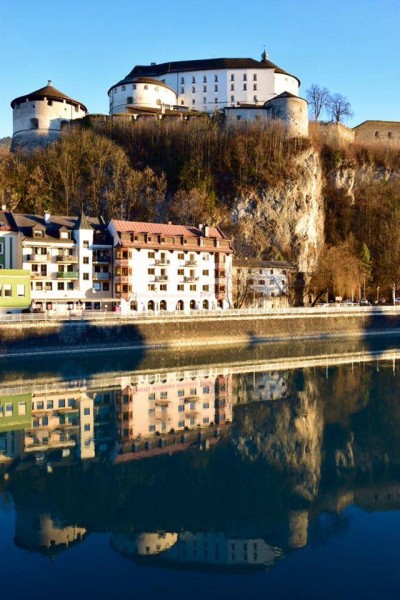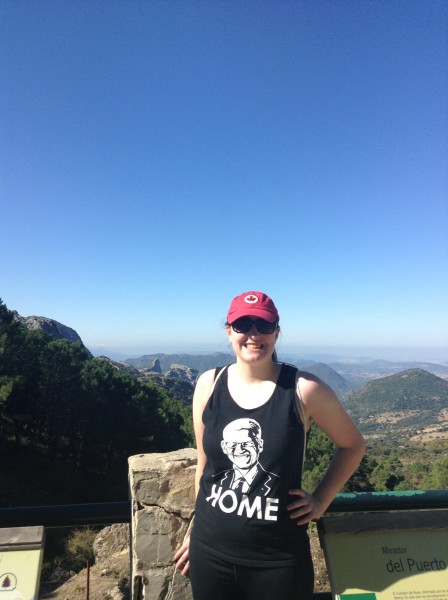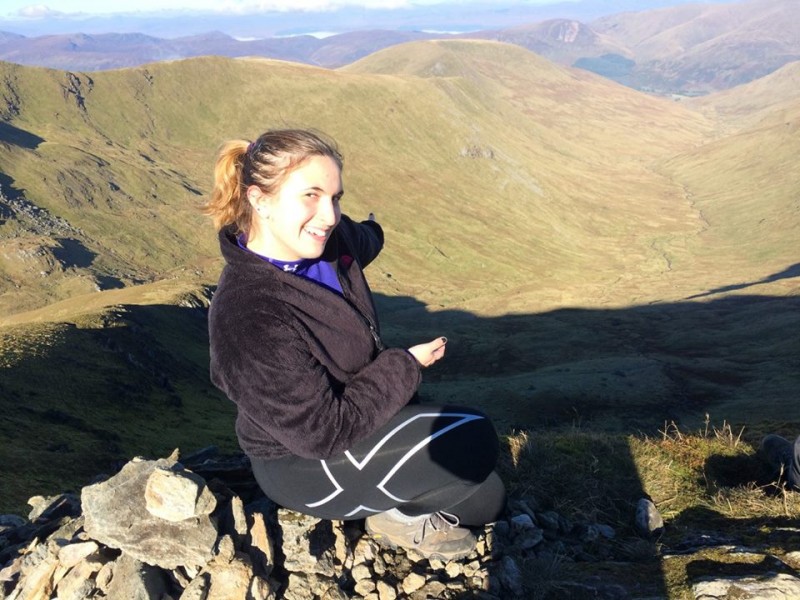Cassandra Mcmurry '17, a double major in History and German, chose to spend her junior year in Munich studying at Ludwig-Maximilians-Universität (LMU).
What was the most memorable thing you learned or did during your time abroad?
It's hard to choose just one memorable moment, but one of my favorites so far was visiting the 800-year-old Fortress Kufstein in Austria and getting the chance to explore a location I had spent quite a bit of time reading about for my courses in Germany. There's something about actually standing in a place where so many events you've read about took place that really makes the significance of the past feel tangible and alive. It's a feeling that I think can only be fully understood by experiencing it, and moments like this remind me why I chose to study history in the first place.
How has studying abroad enhanced your History major?
Studying history I feel that it's always important to consider what factors influence one's perspective, and studying abroad has made me aware of one very powerful one that I hadn't paid much thought to before: national origin. History is approached very differently in Germany, and researching and writing using new methodologies has allowed me to think about different ways historical narrative can be constructed and which methods I believe have the most value for my personal approach. Studying in Germany it's also been fascinating to see the ways in which Germans themselves understand and approach the history of the World Wars and the Holocaust, since these events play directly into the modern German sense of national identity. I also have access to historical sites, documents, and artifacts in Germany in a way that is simply impossible when studying in the US, which has been very helpful for both research work here and for thinking about possible topics for my senior thesis.
What advice would you give to future History students who are considering study abroad?
Studying abroad has been completely invaluable to my studies in history, and I would recommend it to anyone who has even a slight interest in studying in another country. My other piece of advice for those going abroad: it's tempting as a history student to spend all your time in a library or an archive, and while those activities are undeniably valuable and necessary, studying abroad is a very special opportunity to really explore the surviving remnants of history, and it's one that should not be passed up. Visit every historical site and museum you possibly can, because these will be the moments that will remind you why history matters and why you chose to study your particular time period or region.
To read more about Cassandra’s experiences abroad, check out her blog: cassandra-abroad.blogspot.com
Lauren Hall '17, a History major and Spanish minor, chose to spend the fall semester of her junior year in Granada in the ILACA program.
What was the most memorable thing you learned or did during your time abroad?
It was fantastic to be able to travel around Spain, both as a part of my program and on my own. Through travel, I was able to gain a better understanding of the Spanish culture and history I had learned about. For instance, I traveled with a friend to the Basque Country, a region in Northern Spain. I had learned that the Basque Country has its own language, culture, and nationalism. Because of these things, many Basque people feel a stronger connection with their regional Basque identity than their national Spanish identity. One day my friend and I had a delicious lunch at a traditional Basque cider house. As we were leaving, a Basque man stopped to talk to us and asked us how we liked the food. My friend said it was the best food she had had in Spain. The man replied, “But this is not Spain!” I was thrilled that I could finally experience Basque nationalism in person. It was an experience that emphasized the diversity of cultures within Spain, which is something I had studied in my Spanish history and culture classes.
How did your experience studying abroad enhance your History major?
I was able to take Spanish history and culture classes that were not offered at Puget Sound. I had already taken a Spanish class at Puget Sound on twentieth-century Spanish history, and while abroad I was able to study several centuries of Spanish history. Furthermore, I gained a much deeper historical understanding not only through my classes, but also by learning the language, traveling, and living in Spanish society. Also, one historical topic I enjoy studying is national historical monuments. While at Puget Sound I had studied monuments in relation to American history in a history class on Catastrophes in American Culture, and in Spain I visited many national monuments and was able to understand these in the context of Spanish history.
What advice would you give to future History students who are considering study abroad?
Study abroad is still valuable even if you won’t be studying your favorite type of history. My favorite history is not Spanish history (even though I enjoy it), but I still got a lot out of my experience and it definitely enhanced my major. I would also consider whether your program is language immersive or not. Having all my classes and excursions in Spanish and living with a Spanish host family added so much to my experience.
Taylor Roghair '17, a double major in History and Spanish Culture and Literature, chose to spend to spend her junior year abroad, studying at the University of Edinburgh in Scotland in the fall and in Granada, Spain in the spring.
What was the most memorable thing you learned or did during your time abroad?
I learned to live on my own, and to function in an environment and school system very different from the one at UPS. Beyond living in a historic city and being able to see the places that I was learning about, I also learned about the history of Scotland and how its history has affected current events and how historic conflicts, such as separation from England, still resonate.
But I think that the most memorable experience, for me, was learning how to dance traditional Scottish Ceilidh dances. This is something that anyone can participate in, regardless of age or prior experience. For me it was a way to meet some fantastic people as well as learning a skill that most young people in the States don't even think about anymore. I found that dancing really brings people together. I ended up helping my society lead a Ceilidh for the ARCADIA program.
How did your experience studying abroad enhance your History major?
I had the opportunity to study another country’s history while in that country. This enhanced the experience for me in a way that only reading about a place could not. It is an indescribable experience!
What advice would you give to future History students who are considering study abroad?
Go for it! But be prepared to experience a different educational system. In Edinburgh that system is based almost entirely on self-learning. Students are expected to be independent and professors expect them to do the readings and any other work without much direction. Get involved! There is no better way to meet new people or learn about a different culture than involving yourself in their extra curriculars, such as dancing or sports. Go out and explore the city you are living in! This new city is your home, so get to know it. You'll be surprised by what cool little tucked away places you can find. Finally, meet locals. If someone strikes up a conversation see where it leads you. This is true especially when you are homesick. Getting out will help with that, and the more you make the new city you live in home the better your experience will be. I would happily do it all again in a heartbeat.
--------------------
In fall 2014 and fall 2015, Professors John Lear in History and Don Share in Politics and Government taught an interdisciplinary course entitled “Cuba: From Revolution to Evolution,” including a 10-day trip to Cuba. The seminar gave students, including a contingent of history majors, a look at a Marxist-Leninist regime in the midst of a complex and contradictory process of transition, one that the US embargo on travel to Cuba would otherwise not allow them to experience. During the fall semesters, students were trained in Cuban history, politics, culture, and foreign relations, intense classroom sessions interspersed with visits by guest speakers, many of them from Cuba. The group arrived in Cuba extraordinarily prepared, and as a result students took away far more from their travel than the average tourist. In meetings with a whole host of Cubans they asked questions and interpreted the answers with a sophistication that made the professors very proud, and Cubans were more open and hopeful than they might have been previous to the opening of relations between Cuba and the United States announced December 17, 2014.
What follows are some comments by History major and participant Nicholas M Kulawiak, 2018
1) I was drawn to the Cuba travel-study program for various reasons. My main interest in history is 20th Century Europe, especially Eastern Europe after World War One, and so I’ve always been interested in getting a better understanding of Cuba’s relationship with the Soviet Union, and more broadly, its place in the Cold War after the Revolution in 1959. Therefore, I definitely would have taken the class even if it didn’t include the travel component. Granted, the opportunity to travel with professors and students to as fascinating a country as Cuba was one that would have been very difficult to pass up. I’ve traveled a good deal in my life thus far, but never accompanied by so many people or in as focused an academic setting as this. This allowed me to learn experientially — it is one thing to read an article written by a Cuban scholar or diplomat, but to actually interact with that individual in Cuba is something that just cannot be replicated.
2) I knew before the trip that I was going to be traveling with four professors and 17 other students — some of the very brightest this campus has to offer. The amount I learned from professors and fellow students in informal settings, though, was more than I could have imagined. Otherwise mundane occurrences such as bus rides became venues for small discussions about what we’d been seeing in Cuba, how it compared to other places we had been and the like. Times like these are the ones that stick out most vividly to me when I think back to the trip, and the impressions, ideas and analysis that we all were parts of are most relevant to my experience in Cuba.


